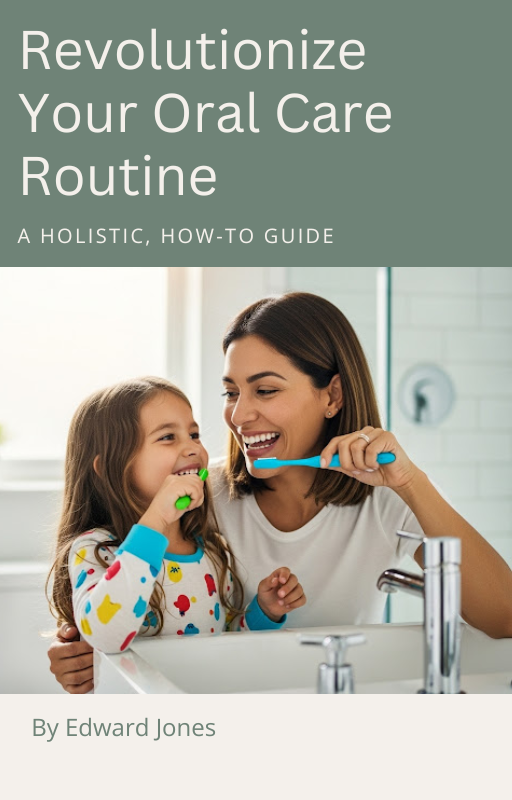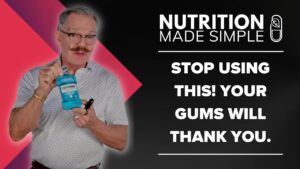When most people think about health, they think about exercise, diet, sleep, and supplements. But there’s one area that often gets overlooked—even by those of us who’ve been in holistic health for decades: oral health.
I recently delved into the latest research connecting oral health to overall health—and what I discovered was eye-opening.
It turns out your gums and teeth don’t just impact your smile. They can influence your heart, brain, blood flow, immune system, and more. Let’s explore what Ed learned and why you may want to give your mouth a little more attention.
Why Oral Health Matters Beyond the Smile
Healthy gums and teeth aren’t just about avoiding cavities. Researchers are finding connections between oral health and:
-
Cognitive health – Certain bacteria in the mouth are being studied for their possible role in memory and brain decline.
-
Heart and circulation – Researchers are exploring links between gum health and whole-body wellness—including circulation and heart health events.
-
Pregnancy outcomes – Studies suggest gum health may affect resilience during pregnancy.
-
Blood sugar and immune function – Oral bacteria can play into how well your body regulates inflammation and defenses.
-
Mood and mental health – Imbalances in the oral microbiome may also play a role in psychological well-being.
This isn’t meant to alarm—it’s meant to empower. Knowing the mouth is a gateway to the rest of the body gives us one more tool to support whole-body wellness.
Meet the Oral Microbiome
Just like your gut has good and bad bacteria, so does your mouth. This “oral microbiome” helps protect teeth, support nitric oxide production (important for blood flow), and maintain balance.
The problem? Common habits like using harsh antiseptic mouthwashes, eating a lot of sugar or processed foods, or neglecting daily care can wipe out the good guys—leaving room for the harmful bacteria to take over.
Simple Steps for a Healthier Mouth
Ed gathered advice from functional dentists, researchers, and nutrition experts. Here are some practical takeaways:
1. Be Gentle With Mouthwash
Antiseptic rinses may feel fresh, but they can destroy beneficial bacteria. Instead, try oil pulling once or twice a week with coconut oil, or use natural rinses that respect the microbiome.
Don’t know what oil pulling is? Find out here.
2. Choose the Right Toothpaste
Fluoride has long been used for enamel, but some people prefer a more natural approach. Hydroxyapatite toothpaste is a newer option that gives your teeth the minerals they need to rebuild enamel naturally.
3. Upgrade Your Toothbrush & Floss
-
Replace your toothbrush every two weeks (bacteria build up fast).
-
Use the softest bristles to protect your gums.
-
Look for floss without “forever chemicals.” (Dr. Tung’s Smart Floss is one Ed recommends.)
4. Support Good Bacteria
-
Add fermented foods like sauerkraut or kefir.
-
Try an oral probiotic (like Life Extension’s Oral Hygiene lozenges) that dissolves in the mouth to restore balance.
5. Consider Mouth Taping at Night
Mouth breathing while you sleep can dry out saliva and feed harmful bacteria. Using a gentle tape (like Sleepy Owl) may help promote nose breathing, better saliva flow, and calmer sleep.
Read more about mouth taping here.
6. Chew Xylitol Gum After Meals
Xylitol tricks harmful bacteria into “thinking” they’re feeding—without actually giving them energy. This helps protect teeth between meals. Ed recommends PUR gum for purity and quality.
7. Don’t Forget the Basics
-
Brush and floss every evening (nighttime care is even more important than mornings).
-
Eat nutrient-dense foods—avoid seed oils and excess sugar.
-
Consider supplements that support foundational health: a quality multivitamin, magnesium, vitamin D, and omega-3s.
A Personal Discovery
After more than 46 years in holistic health, Ed admits oral health was a missing piece in his own routine. But with what he’s learned, he’s now making oral care part of his core pillars of health—alongside sleep, diet, supplements, and exercise.
As Maya Angelou once said, “When you know better, you do better.” Ed adds: “…IF you choose to do better.”
Watch my Revolutionizing Oral Health video here.
Final Oral Health Thoughts
Oral health isn’t just about avoiding cavities or keeping a bright smile. It’s a foundational part of your body’s wellness network—touching everything from circulation and immunity to mood and sleep.
The good news? You don’t need complicated or expensive interventions to start supporting it. With consistent care, the right tools, and a little bit of education, you can set your mouth—and your whole body—up for long-term health.
At Nutrition World, we carry natural oral care products, probiotics, clean toothpaste options, and everyday wellness tools to help you put this into practice. Stop by or explore our online store to start building your own oral health plan.
View our Oral Bundle online.

Try Your Oral Health Routine Guide
What Is Oil Pulling, Really?
Oil pulling is an ancient Ayurvedic practice that’s been around for hundreds of years. The idea is simple: you swish a small amount of oil (like coconut or sesame) around in your mouth for 10–20 minutes, then spit it out.
Think of it like a gentle “detox rinse” for your mouth. The oil helps loosen up and carry away debris, food particles, and some of the bad bacteria that can form plaque or irritate gums. Some experts also believe it may help disrupt biofilms—the protective coating that harmful bacteria build, kind of like a shield.
How to Do It:
-
Put about a teaspoon of oil (coconut oil is popular because it tastes light and melts easily) in your mouth.
-
Swish it gently between your teeth and around your gums—no need to swish hard.
-
After 10–20 minutes, spit it into the trash (not the sink, since oil can clog drains).
-
Rinse your mouth with warm water and brush as usual.
Tips:
-
You don’t need to do this every day—once or twice a week is enough for most people.
-
Don’t swallow the oil—it’s meant to carry bacteria and debris out.
-
If 20 minutes feels overwhelming, start with 5 minutes and work up.



